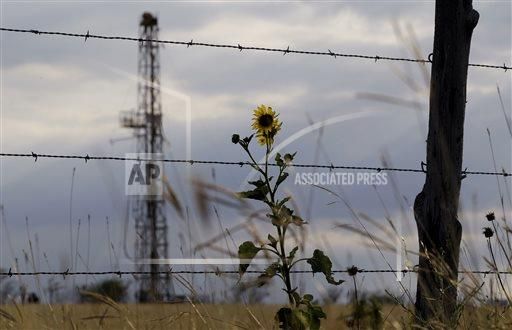A pair of office towers in Tulsa, Oklahoma, is giving commercial real estate investors more reason to worry that the collapse in oil prices is starting to infect their market.
The biggest tenant, oil and gas producer Samson Resources Corp., vacated one of the more than a dozen floors it occupied, according to a report from the firm that services a $45 million mortgage on the buildings known as the Williams Center Towers. Samson, which is cutting its workforce as it prepares to file for bankruptcy protection this month, has indicated it will abandon another floor next year, and its lease gives it the right to withdraw from more space after that, according to the report.
Samson’s shrinking footprint is laying bare the risks faced in cities that boomed amid the U.S. shale revolution — and are now the most vulnerable to the commodities rout. That’s increasing concern in the market for commercial mortgage bonds, where yield-hungry debt investors have helped fund everything from office space for oil executives to housing for rig workers.
Real estate investors are watching companies like Samson that have struggled to find capital amid a plunge in crude prices. With the value of their reserves declining, banks and even distressed-debt investors have either pulled back on credit or shown reluctance to provide additional aid.
“It’s going to be game over if these companies can’t get financing again,” said Danielle DiMartino Booth, chief market strategist at the research group Liscio Report, who recently left a position as adviser to former Federal Reserve Bank of Dallas President Richard Fisher. “Plenty of companies were able to buy themselves six to 12 months of time earlier this year. Unless we see a rebound, I don’t see them getting financing again.”
The pullback has already been straining landlords to the oil industry.
In Decatur, Texas, the owner of a Candlewood Suites frequently used by energy workers has struggled to pay a $4.9 million mortgage after cutbacks in the industry, according to a loan servicer report. In July, the mortgage was handed to a so- called special servicer. Such firms typically decide whether to modify loan terms or foreclose on the property. A message left for the property’s owner at the hotel wasn’t returned.
The Texas hotel, which is among properties backing a commercial-mortgage bond created in 2013, is one of several extended-stay lodgings in oil regions that have been affected by the slowdown, according to debt strategists at Barclays. At an extended-stay workers’ complex in North Dakota, some 134 units of Strata Estate Suites were originally leased to 27 corporate tenants including Halliburton, according to documents provided to investors. The loan was among mortgages bundled into $45 million of commercial mortgage securities in August 2013 and sold to investors such as life insurers. The mortgage has been delinquent for 20 months, Bloomberg data show.
About $16 billion of real estate debt that’s now vulnerable to default because of plunging crude prices was packaged into bonds and sold to investors, according to estimates from Nomura.
Samson’s headcount has fallen to 606 from 997 at the end of last year, with 343 left in Tulsa, according to Brian Maddox, a spokesman for Samson at FTI Consulting. The company is still making rent payments for its offices in the Williams Center Towers, where it has been occupying 35 percent of the buildings’ almost 766,000 square feet of space, Barclays strategists led by Jasraj Vaidya wrote in an Aug. 28 note.
The concern is whether the KKR & Co.-owned company seeks to terminate or scale back its lease during bankruptcy proceedings, the analysts wrote. The mortgage on the office building was bundled into a bond deal last year.
Maddox declined to comment beyond confirming the staff reductions. Telephone messages left for the property’s owners were not returned.
While the energy strains have yet to cause any widespread selling of commercial-mortgage bonds, the industry’s woes are adding to a list of risks for a market where demand for higher- yielding assets has allowed Wall Street banks to package increasingly risky loans into the securities.
In addition to office towers, commercial-mortgage investors also back shopping malls, which have been under siege by online retailers. Banks also have been loading more bond deals with properties in regions that are less economically diverse.
That’s particularly an issue in cities and towns that rode the oil boom. In Houston, where more than a third of the local economy is tied to the energy industry, homebuilders and real estate investors face a potential housing glut, said Britton Costa, a Fitch Ratings analyst who covers real estate investment trusts. A wave of new developments slated to be ready over the next year is increasing those risks, he said.
“It’s going to get a lot worse before it gets better if oil stays low,” said Andy McCulloch, an analyst at Newport Beach, California-based Green Street Advisors. “A lot of operators can hide behind long leases, so losses may not immediately show up in the financials.”
****
Jody Shenn contributed.






